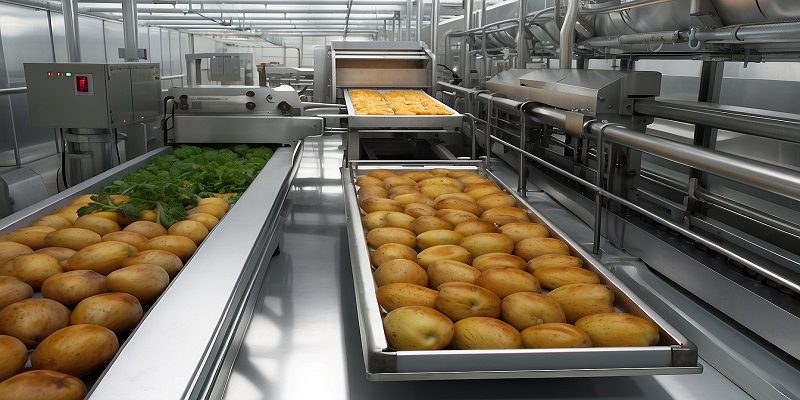From Farm to Fork: How Technology is Revolutionizing the Food Industry

In today’s fast-paced world, the food industry is experiencing a transformation like never before. Advancements in technology are reshaping every aspect of the food supply chain, from farm to fork. This revolution is not only changing the way we produce and consume food but also addressing key challenges such as food security, sustainability, and efficiency. In this article, we will explore how technology is driving this transformation and shaping the future of the food industry.
Recision Agriculture:
Cultivating Innovation
Precision agriculture is revolutionizing the way farmers manage their crops and livestock. By leveraging technologies such as GPS, drones, and sensors, farmers can collect real-time data on soil conditions, weather patterns, and crop health. This data-driven approach allows for more precise and efficient farming practices, reducing waste and increasing yields. From automated irrigation systems to predictive analytics, precision agriculture is empowering farmers to make informed decisions and optimize resource use.
Smart Farming:
Harnessing the Power of IoT
The Internet of Things (IoT) is playing a crucial role in the evolution of smart farming. IoT devices, such as smart sensors and connected machinery, enable farmers to monitor and manage their operations remotely. These devices collect data on everything from soil moisture levels to equipment performance, allowing farmers to streamline processes and improve productivity. With the help of IoT technology, farmers can automate tasks, minimize risks, and maximize yields, ultimately leading to a more sustainable and profitable agricultural sector.
Vertical Farming:
Growing Up, Not Out
Vertical farming is reimagining traditional agriculture by growing crops in vertically stacked layers, often in controlled indoor environments. This innovative approach utilizes technologies like hydroponics, aeroponics, and LED lighting to optimize growing conditions and maximize space efficiency. Vertical farms can be established in urban areas, reducing the need for long-distance transportation and providing fresh produce to local communities year-round. By minimizing water usage, pesticide use, and land requirements, vertical farming offers a sustainable solution to the challenges of traditional agriculture.
Food Traceability:
Ensuring Transparency and Safety
With concerns about food safety and authenticity on the rise, traceability has become a top priority for consumers and regulators alike. Blockchain technology is revolutionizing food traceability by providing a transparent and immutable record of the entire supply chain. By recording each step of the journey from farm to fork, blockchain enables consumers to verify the authenticity and quality of their food products. This level of transparency not only builds trust but also facilitates faster and more effective recalls in the event of a foodborne illness outbreak.
Sustainable Packaging:
Reducing Waste, Preserving Resources
The food industry is increasingly embracing sustainable packaging solutions to minimize environmental impact and meet consumer demand for eco-friendly products. Biodegradable materials, such as compostable plastics and plant-based fibers, are replacing traditional petroleum-based packaging, reducing reliance on non-renewable resources. Additionally, innovations in packaging design, such as active and intelligent packaging, are extending shelf life and reducing food waste. By adopting sustainable packaging practices, food companies can reduce their carbon footprint and contribute to a healthier planet.
Personalized Nutrition:
Catering to Individual Needs
Advancements in technology are enabling personalized nutrition solutions that cater to the unique dietary needs and preferences of individuals. From mobile apps that track dietary intake to DNA-based nutrition testing kits, consumers have access to tools that help them make more informed food choices. This shift towards personalized nutrition reflects a growing awareness of the link between diet and health, empowering individuals to take control of their well-being. By leveraging technology to deliver personalized nutrition recommendations, the food industry can support healthier lifestyles and foster consumer loyalty.
Food Delivery Platforms:
Changing the Way We Eat
The rise of food delivery platforms has transformed the way consumers access and enjoy food. From meal kits to grocery delivery services, these platforms offer convenience and variety, allowing consumers to enjoy restaurant-quality meals in the comfort of their own homes. Advances in logistics and delivery technology have made it possible to deliver food faster and more efficiently than ever before. Whether it’s ordering takeout from a local restaurant or having groceries delivered to their doorstep, consumers are embracing the convenience of food delivery platforms as a staple of modern life.
Conclusion
From precision agriculture to personalized nutrition, technology is reshaping every aspect of the food industry. By embracing innovation and harnessing the power of technology, the food industry is not only becoming more efficient and sustainable but also more responsive to the needs of consumers. As we continue to navigate the challenges of feeding a growing global population, technology will play an increasingly vital role in ensuring a safe, secure, and sustainable food supply for generations to come.




